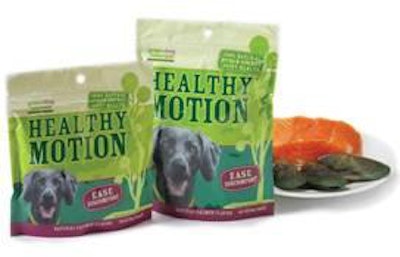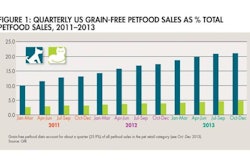
The pet industry is an incredibly dynamic marketplace that is no longer dependant on independent retailers and supermarkets offering only basic necessities.
The pet market continues to grow as a result of a constant stream of new and innovative products, a steadily growing aging animal population and the expanding role that pets play as family members. Further, the "humanization" of pets is exaggerating consumer demand for products and services that are as good (and sometimes better) as those available for people themselves. And pet product companies are responding to this demand with innovative products that are well formulated and contain ingredients that target the specific physiological (and even psychological) needs of today's pet.
Consumers' love affair with their furry friends has produced a strong and growing trend in the care, feeding and well being of pets. According to the American Pet Products Manufacturing Association (APPMA), there are 358.8 million pets in the U.S. (versus only 297 million people). During 2004, Americans spent well over $34 billion on their pets (versus $17 billion in 1994). And the 2005-2006 APPMA National Pet Owners Survey predicts that Americans will spend $14.5 billion on pet food; $8.8 billion on supplies and over-the-counter medications; and $1.6 billion on veterinary care. Pet Age, a pet industry trade publication, predicts that animal supplement sales will reach $1 billion by mid-2006.
Why All the Interest in Pet Supplements?
The increasing awareness of the benefits of animal supplements comes as no surprise to baby boomers and older people who continue to be among the primary consumers of human dietary supplements, which enhance health, may prevent disease and slow the aging process.
Pet owners purchase supplements to ensure their pets receive the proper nutrition, which might be lacking in off-the-shelf pet foods. Even though a plethora of "lifestyle" and "life stage" pet foods are marketed, some veterinarians worry that such foods provide only basic protein, fat and fiber, plus a few vitamins and minerals. Since pets do not have the varied diets that humans do, they can quickly become susceptible to increased risk of disease and poor health when their food lacks certain nutrients.
Pets are living longer than ever before. Unfortunately, older animals are prone to many of the same types of chronic conditions that plague elderly people, including cancer, cardiovascular disease, arthritis, cataracts, and even thinning hair. Pet owners often choose supplementation in order to help maintain health and ease age-related aches and pains in their older companions.
Veterinary healthcare costs, like human healthcare costs, are increasing rapidly. So just as consumers are looking to reduce their own healthcare costs by purchasing natural foods and nutritional supplements, they are equally interested in taking charge of the health of their dogs, cats, horses and other companion animals by purchasing products that promote health and vitality.
Natural ingredients are perceived to have an edge over conventional pharmaceuticals because they rarely cause side effects or interact with prescription drugs. Supplements have been shown to be safe if used judiciously. While there are a few reported adverse events with supplements (e.g., kava, ephedra and St. John's Wort), they don't compare to the potential adverse reactions of pharmaceuticals.
There is the growing trend to treat pets as family members. According to the 2000 Pet Owner Survey conducted by the American Animal Hospital Association, 83% of respondents said they refer to themselves as their pet's "mom" or "dad" and want to care for their animals in the best way possible. Put simply, people want good health for their pets the same way they want it for their children.
Because supplements are readily available in food, drug and mass retail outlets and heavily discussed in consumer magazines and newspapers, there is greater understanding and appreciation for the roles they play in promoting health and vitality. The use of supplements for pets is a logical extension of such increased awareness. The use of human supplements in animals, however, is illegal because pet application is not the clearly defined use of the product.
Animal Supplement Regulation
Animal foods and supplements come under the regulatory scheme of the Federal Food, Drugs, and Cosmetic Act. The Dietary Supplement Health and Education Act (DSHEA), which governs human dietary supplements does not apply to animals. The FDA and the Association of American Feed Control Officials (AAFCO) have been charged with the regulation and control of animal supplements, even though they are neither foods nor drugs. FDA's Center for Veterinary Medicine (FDA-CVM) relies on AAFCO to deny or approve sales and distribution of all animal supplements, an expensive and time-consuming process that, because of the inconsistency of state laws, can be confusing and tedious.
A few years ago it was feared that over-the-counter (OTC) sales of animal supplements would be prohibited because they were often positioned as curative rather than preventative. Today, FDA-CVM accepts the marketing of oral supplements for animals provided there is a "recognized benefit, purpose or utility" and they are not a substitute for a "complete and balanced" diet or represented to prevent or cure disease. Labeling guidelines have been created whereby supplements considered "foods" (i.e., multivitamins) have a label format distinct from those considered remedies, or "drugs of low priority" that may contain ingredients like glucosamine, chondroitin or methylsulfonylmethane (MSM) products.
For now, AAFCO only regulates labeling of "food-type" supplements, although it certainly watches for egregious label claims or ingredient misrepresentations of all animal supplements. Seven states, including Texas, Oregon, Michigan, North Dakota, South Dakota, Virginia and Wyoming, have enacted "remedy laws" to regulate supplements that do not qualify as "foods" according to the AAFCO definition.
In 2001, manufacturers and suppliers of nutritional supplements for companion animals and wildlife joined together to form the not-for-profit National Animal Supplement Council (NASC), a self-policing body that works closely with FDA-CVM and AAFCO to establish regulatory guidelines that are fair, reasonable, responsible and nationally consistent, and serve the best interests of animals. The cornerstone of the NASC is CompliancePlus, a program that provides a framework for product quality assurance and labeling guidelines, as well as a system for supplement-associated adverse event reporting. The defined parameters of the CompliancePlus program combined with NASC scrutiny validates audited member company standards of quality, prevents mislabeling and tracks product sales and adverse events. Only member companies that have successfully passed an independent audit and comply with the guidelines of the CompliancePlus program are permitted to display the NASC "Seal of Quality" on their products. NASC also ensures that its members adhere to product labeling guidelines and maintain a system of adverse event reporting.
Hot Segments
Following the lead of human dietary supplements for conditions that include cardiovascular, bone and joint, eye and cognitive health, condition-specific pet supplements are one of the fastest growing segments in the pet nutraceuticals market. Supplements that benefit pet joint health, skin and coat condition and anxiety are showing the most growth.
Joints. Osteoarthritis, often referred to as arthritis, is the most common musculoskeletal disorder in pets, especially among large breed dogs eights years of age and older. The joints usually affected are hips (where arthritis is often secondary to hip dysplasia) and thoracic, lumbar and sacral vertebrae. Canine Hip Dysplasia (CHD) is a condition that some large breeds, such as Golden Retrievers and German Shepherds, are genetically predisposed to. Smaller breeds, like Poodles and Dachshunds, often cope with knee and spinal conditions.
The mainstay of conventional medicine involves long-term administration of nonsteroidal anti-inflammatory drugs (NSAIDS), most commonly etodolac (Eto-Gesic) or carprofen (Rimadyl). Unfortunately, as is the case with people, pets can have both acute and chronic side effects from this class of medication. Acute reactions to NSAIDS are most commonly reported as severe hepatopathies in Labrador Retrievers. The FDA's recent warning regarding NSAID's use in humans and Merck's withdrawal of Vioxx, together with well-publicized concerns about Rimadyl in dogs, have pushed consumers to seek products felt to be safer, yet still effective.
According to a report in the New England Journal of Medicine in 1999, NSAIDS were the 15th leading cause of death in people in the U.S. Unfortunately, accurate figures with regard to adverse events in pets are hard to come by because they are rarely reported by veterinarians or pet owners. As a result, finding information on NSAID reactions in pets is difficult.
Based on my experience and that of other veterinarians, reactions to medicines including antibiotics, corticosteroids, and NSAIDS seem to be at least as common in pets as in people. Using NSAIDS wisely, which implies their use on an "as-needed" basis, and relying instead on a natural joint supplement for chronic therapy, is the safest approach to treating arthritis in people and pets.
Skin and Coat. The skin is the body's largest organ system. It acts to protect an animal from injury and infection, helps control internal temperature, and serves as a reservoir for certain nutrients. The hair coat insulates the body and shields the skin from injury due to sunlight, heat and irritants. The physical condition of this important organ is vital to the health of animals, and supplements containing omega fatty acids are commonly used by pet owners to maintain skin health and promote a lustrous, healthful coat.
Omega 3 fatty acids (derived from flaxseed oil and fish oil) may help reduce the signs of allergies and other skin inflammatory conditions, such as itching and reddening. Omega 3 fatty acids, including alpha-linolenic acid (ALA), eicosapentaenoic acid (EPA) and docosa-hexaenoic acid (DHA), are used preferentially for select functions, such as proper brain development and reduced inflammatory response. Veterinarians often advocate the use of omega 3 fatty acids as "routine supplements" for dogs or cats with non-specific skin problems. Although most pet foods contain far more omega 6 than omega 3 fatty acids, supplemental omega 6's may benefit animals with dry coats.
Anxiety. Lives have become busier and more complicated, resulting in increased levels of stress and anxiety. Often pets' personalities and behaviors are reflective of their owner's inability to cope with a frenzied lifestyle, as well as the amount of time many pets spend alone. Dogs are pack animals and easily affected with separation anxiety, signs of which include chewing or tearing furniture or other objects, excessive salivation and inappropriate urination and defecation. Cats and dogs are also easily stressed with travel, boarding, grooming and visits to the veterinarian.
Sedatives and calming drugs like Prozac tend to produce sleepy, lethargic pets. Supplements containing blends of natural herbs or mixtures of chamomile, ginger and tryptophan help reduce anxiety without causing sluggishness and disorientation.
Animal pheromones are also used to reduce anxiety in dogs and cats. One particular company markets a synthetic equivalent to the pheromone secreted by the sebaceous glands around the nipples of a nursing female dog. It is designed to remind the pet of that very safe, secure, happy feeling the dog had as a nursing puppy. The product can be used with behavioral modification programs developed by animal behavior experts. Although there have been no placebo-controlled studies on pheromones to date, their use to reduce anxiety in animals is a rapidly growing segment.
Fortified Pet Foods
Pet food manufacturers recognize the importance of supplemental nutrients in promoting health, as well as reducing the effects of certain conditions in animals. Condition-specific ingredients, such as glucosamine, chondroitin, carnitine, antioxidants, prebiotics and probiotics, are commonly used as marketing tools to suggest that such "fortified" foods can address special health needs. Unfortunately, the inclusion of such ingredients raises many questions. Are the amounts actually consumed by pets effective? Are these ingredients stable enough to withstand high temperatures of extrusion, cooking or baking? Do they maintain their activities during prolonged storage on retail shelves? Do all animals require the same levels?
The chondro-protective nutrients glucosamine and chondroitin commonly formulated into older and active premium dog foods are the source of biggest controversy, especially when it comes to levels present in foods. It is generally accepted by veterinarians that larger, older breeds predisposed to joint conditions may benefit from 500 mg of glucosamine once or twice daily. Many brands of premium pet food sold in pet specialty stores contain 200-800 mg of glucosamine per kg (2.2 pounds) of food--not body weight--thus making it difficult for dogs to ingest levels sufficient to promote joint flexibility and maintain healthy joint connective tissue without overeating. Incorporating ingredients not listed as approved ingredients in the Official Publication of AAFCO and "not recognized as essential nutrients by AAFCO Nutrient Profiles" into pet foods adds to the controversy because foods containing such components are considered "adulterated" by AAFCO. Still, many pet food companies continue to incorporate these and other unapproved ingredients into their formulations, and too many pet owners continue to rely solely on pet foods to provide all the nutrients needed to optimize their animal's health.
The Future
The pet industry is an incredibly dynamic marketplace that is no longer dependant on independent retailers and supermarkets offering only basic necessities. The industry-dominating behemoths Petsmart and Petco (with combined sales of more than $5 billion) continue to increase their market share in spite of challenges from Costco, Wal-Mart, whole food chains like Whole Foods and Wild Oats, and large grocery conglomerates. Large, multinational companies such as Proctor & Gamble and Colgate-Palmolive, along with deep-pocketed investment groups are hoping to cash in on the future growth of the industry through the purchase of pet product companies. Pet products are popping up everywhere, including Orvis and L.L. Bean catalogues, at Saks Fifth Avenue, Anthropologie, T.J. Maxx and more. Even Sears has announced a new format that includes a pet aisle.
The health consciousness that has become the lifestyle choice for millions of today's consumers combined with such trends as humanizing and indulging pets is propelling sales of animal supplements forward. The increased emphasis on "healthy" products by mass marketers, independent retailers and large pet specialty stores, coupled with the new standards of quality implemented by the National Animal Supplement Council is further boosting awareness (and credibility) of animal supplements. Even natural foods retailers have recognized that sales of pet supplements have been historically tepid because little effort was put into maintaining a healthy pet section. Today a different mind set addresses different consumer desires when it comes to their pets.
Pet owners are demanding animal supplements and retailers are responding by focusing on quality, selection and a willingness to educate themselves as to the science behind condition-specific supplements. As a result, pet supplements are easier to find and easier to understand. By organizing and displaying supplements to emphasize benefit, purpose and function, retailers are helping pet owners fine tune pet foods with natural dietary supplements. In the end, this integrated and holistic approach to animal health management may even help them live longer too.
Consumers' love affair with their furry friends has produced a strong and growing trend in the care, feeding and well being of pets. According to the American Pet Products Manufacturing Association (APPMA), there are 358.8 million pets in the U.S. (versus only 297 million people). During 2004, Americans spent well over $34 billion on their pets (versus $17 billion in 1994). And the 2005-2006 APPMA National Pet Owners Survey predicts that Americans will spend $14.5 billion on pet food; $8.8 billion on supplies and over-the-counter medications; and $1.6 billion on veterinary care. Pet Age, a pet industry trade publication, predicts that animal supplement sales will reach $1 billion by mid-2006.
Why All the Interest in Pet Supplements?
The increasing awareness of the benefits of animal supplements comes as no surprise to baby boomers and older people who continue to be among the primary consumers of human dietary supplements, which enhance health, may prevent disease and slow the aging process.
Pet owners purchase supplements to ensure their pets receive the proper nutrition, which might be lacking in off-the-shelf pet foods. Even though a plethora of "lifestyle" and "life stage" pet foods are marketed, some veterinarians worry that such foods provide only basic protein, fat and fiber, plus a few vitamins and minerals. Since pets do not have the varied diets that humans do, they can quickly become susceptible to increased risk of disease and poor health when their food lacks certain nutrients.
Pets are living longer than ever before. Unfortunately, older animals are prone to many of the same types of chronic conditions that plague elderly people, including cancer, cardiovascular disease, arthritis, cataracts, and even thinning hair. Pet owners often choose supplementation in order to help maintain health and ease age-related aches and pains in their older companions.
Veterinary healthcare costs, like human healthcare costs, are increasing rapidly. So just as consumers are looking to reduce their own healthcare costs by purchasing natural foods and nutritional supplements, they are equally interested in taking charge of the health of their dogs, cats, horses and other companion animals by purchasing products that promote health and vitality.
Natural ingredients are perceived to have an edge over conventional pharmaceuticals because they rarely cause side effects or interact with prescription drugs. Supplements have been shown to be safe if used judiciously. While there are a few reported adverse events with supplements (e.g., kava, ephedra and St. John's Wort), they don't compare to the potential adverse reactions of pharmaceuticals.
There is the growing trend to treat pets as family members. According to the 2000 Pet Owner Survey conducted by the American Animal Hospital Association, 83% of respondents said they refer to themselves as their pet's "mom" or "dad" and want to care for their animals in the best way possible. Put simply, people want good health for their pets the same way they want it for their children.
Because supplements are readily available in food, drug and mass retail outlets and heavily discussed in consumer magazines and newspapers, there is greater understanding and appreciation for the roles they play in promoting health and vitality. The use of supplements for pets is a logical extension of such increased awareness. The use of human supplements in animals, however, is illegal because pet application is not the clearly defined use of the product.
Animal Supplement Regulation
Animal foods and supplements come under the regulatory scheme of the Federal Food, Drugs, and Cosmetic Act. The Dietary Supplement Health and Education Act (DSHEA), which governs human dietary supplements does not apply to animals. The FDA and the Association of American Feed Control Officials (AAFCO) have been charged with the regulation and control of animal supplements, even though they are neither foods nor drugs. FDA's Center for Veterinary Medicine (FDA-CVM) relies on AAFCO to deny or approve sales and distribution of all animal supplements, an expensive and time-consuming process that, because of the inconsistency of state laws, can be confusing and tedious.
A few years ago it was feared that over-the-counter (OTC) sales of animal supplements would be prohibited because they were often positioned as curative rather than preventative. Today, FDA-CVM accepts the marketing of oral supplements for animals provided there is a "recognized benefit, purpose or utility" and they are not a substitute for a "complete and balanced" diet or represented to prevent or cure disease. Labeling guidelines have been created whereby supplements considered "foods" (i.e., multivitamins) have a label format distinct from those considered remedies, or "drugs of low priority" that may contain ingredients like glucosamine, chondroitin or methylsulfonylmethane (MSM) products.
For now, AAFCO only regulates labeling of "food-type" supplements, although it certainly watches for egregious label claims or ingredient misrepresentations of all animal supplements. Seven states, including Texas, Oregon, Michigan, North Dakota, South Dakota, Virginia and Wyoming, have enacted "remedy laws" to regulate supplements that do not qualify as "foods" according to the AAFCO definition.
In 2001, manufacturers and suppliers of nutritional supplements for companion animals and wildlife joined together to form the not-for-profit National Animal Supplement Council (NASC), a self-policing body that works closely with FDA-CVM and AAFCO to establish regulatory guidelines that are fair, reasonable, responsible and nationally consistent, and serve the best interests of animals. The cornerstone of the NASC is CompliancePlus, a program that provides a framework for product quality assurance and labeling guidelines, as well as a system for supplement-associated adverse event reporting. The defined parameters of the CompliancePlus program combined with NASC scrutiny validates audited member company standards of quality, prevents mislabeling and tracks product sales and adverse events. Only member companies that have successfully passed an independent audit and comply with the guidelines of the CompliancePlus program are permitted to display the NASC "Seal of Quality" on their products. NASC also ensures that its members adhere to product labeling guidelines and maintain a system of adverse event reporting.
Hot Segments
Following the lead of human dietary supplements for conditions that include cardiovascular, bone and joint, eye and cognitive health, condition-specific pet supplements are one of the fastest growing segments in the pet nutraceuticals market. Supplements that benefit pet joint health, skin and coat condition and anxiety are showing the most growth.
Joints. Osteoarthritis, often referred to as arthritis, is the most common musculoskeletal disorder in pets, especially among large breed dogs eights years of age and older. The joints usually affected are hips (where arthritis is often secondary to hip dysplasia) and thoracic, lumbar and sacral vertebrae. Canine Hip Dysplasia (CHD) is a condition that some large breeds, such as Golden Retrievers and German Shepherds, are genetically predisposed to. Smaller breeds, like Poodles and Dachshunds, often cope with knee and spinal conditions.
The mainstay of conventional medicine involves long-term administration of nonsteroidal anti-inflammatory drugs (NSAIDS), most commonly etodolac (Eto-Gesic) or carprofen (Rimadyl). Unfortunately, as is the case with people, pets can have both acute and chronic side effects from this class of medication. Acute reactions to NSAIDS are most commonly reported as severe hepatopathies in Labrador Retrievers. The FDA's recent warning regarding NSAID's use in humans and Merck's withdrawal of Vioxx, together with well-publicized concerns about Rimadyl in dogs, have pushed consumers to seek products felt to be safer, yet still effective.
According to a report in the New England Journal of Medicine in 1999, NSAIDS were the 15th leading cause of death in people in the U.S. Unfortunately, accurate figures with regard to adverse events in pets are hard to come by because they are rarely reported by veterinarians or pet owners. As a result, finding information on NSAID reactions in pets is difficult.
Based on my experience and that of other veterinarians, reactions to medicines including antibiotics, corticosteroids, and NSAIDS seem to be at least as common in pets as in people. Using NSAIDS wisely, which implies their use on an "as-needed" basis, and relying instead on a natural joint supplement for chronic therapy, is the safest approach to treating arthritis in people and pets.
Skin and Coat. The skin is the body's largest organ system. It acts to protect an animal from injury and infection, helps control internal temperature, and serves as a reservoir for certain nutrients. The hair coat insulates the body and shields the skin from injury due to sunlight, heat and irritants. The physical condition of this important organ is vital to the health of animals, and supplements containing omega fatty acids are commonly used by pet owners to maintain skin health and promote a lustrous, healthful coat.
Omega 3 fatty acids (derived from flaxseed oil and fish oil) may help reduce the signs of allergies and other skin inflammatory conditions, such as itching and reddening. Omega 3 fatty acids, including alpha-linolenic acid (ALA), eicosapentaenoic acid (EPA) and docosa-hexaenoic acid (DHA), are used preferentially for select functions, such as proper brain development and reduced inflammatory response. Veterinarians often advocate the use of omega 3 fatty acids as "routine supplements" for dogs or cats with non-specific skin problems. Although most pet foods contain far more omega 6 than omega 3 fatty acids, supplemental omega 6's may benefit animals with dry coats.
Anxiety. Lives have become busier and more complicated, resulting in increased levels of stress and anxiety. Often pets' personalities and behaviors are reflective of their owner's inability to cope with a frenzied lifestyle, as well as the amount of time many pets spend alone. Dogs are pack animals and easily affected with separation anxiety, signs of which include chewing or tearing furniture or other objects, excessive salivation and inappropriate urination and defecation. Cats and dogs are also easily stressed with travel, boarding, grooming and visits to the veterinarian.
Sedatives and calming drugs like Prozac tend to produce sleepy, lethargic pets. Supplements containing blends of natural herbs or mixtures of chamomile, ginger and tryptophan help reduce anxiety without causing sluggishness and disorientation.
Animal pheromones are also used to reduce anxiety in dogs and cats. One particular company markets a synthetic equivalent to the pheromone secreted by the sebaceous glands around the nipples of a nursing female dog. It is designed to remind the pet of that very safe, secure, happy feeling the dog had as a nursing puppy. The product can be used with behavioral modification programs developed by animal behavior experts. Although there have been no placebo-controlled studies on pheromones to date, their use to reduce anxiety in animals is a rapidly growing segment.
Fortified Pet Foods
Pet food manufacturers recognize the importance of supplemental nutrients in promoting health, as well as reducing the effects of certain conditions in animals. Condition-specific ingredients, such as glucosamine, chondroitin, carnitine, antioxidants, prebiotics and probiotics, are commonly used as marketing tools to suggest that such "fortified" foods can address special health needs. Unfortunately, the inclusion of such ingredients raises many questions. Are the amounts actually consumed by pets effective? Are these ingredients stable enough to withstand high temperatures of extrusion, cooking or baking? Do they maintain their activities during prolonged storage on retail shelves? Do all animals require the same levels?
The chondro-protective nutrients glucosamine and chondroitin commonly formulated into older and active premium dog foods are the source of biggest controversy, especially when it comes to levels present in foods. It is generally accepted by veterinarians that larger, older breeds predisposed to joint conditions may benefit from 500 mg of glucosamine once or twice daily. Many brands of premium pet food sold in pet specialty stores contain 200-800 mg of glucosamine per kg (2.2 pounds) of food--not body weight--thus making it difficult for dogs to ingest levels sufficient to promote joint flexibility and maintain healthy joint connective tissue without overeating. Incorporating ingredients not listed as approved ingredients in the Official Publication of AAFCO and "not recognized as essential nutrients by AAFCO Nutrient Profiles" into pet foods adds to the controversy because foods containing such components are considered "adulterated" by AAFCO. Still, many pet food companies continue to incorporate these and other unapproved ingredients into their formulations, and too many pet owners continue to rely solely on pet foods to provide all the nutrients needed to optimize their animal's health.
The Future
The pet industry is an incredibly dynamic marketplace that is no longer dependant on independent retailers and supermarkets offering only basic necessities. The industry-dominating behemoths Petsmart and Petco (with combined sales of more than $5 billion) continue to increase their market share in spite of challenges from Costco, Wal-Mart, whole food chains like Whole Foods and Wild Oats, and large grocery conglomerates. Large, multinational companies such as Proctor & Gamble and Colgate-Palmolive, along with deep-pocketed investment groups are hoping to cash in on the future growth of the industry through the purchase of pet product companies. Pet products are popping up everywhere, including Orvis and L.L. Bean catalogues, at Saks Fifth Avenue, Anthropologie, T.J. Maxx and more. Even Sears has announced a new format that includes a pet aisle.
The health consciousness that has become the lifestyle choice for millions of today's consumers combined with such trends as humanizing and indulging pets is propelling sales of animal supplements forward. The increased emphasis on "healthy" products by mass marketers, independent retailers and large pet specialty stores, coupled with the new standards of quality implemented by the National Animal Supplement Council is further boosting awareness (and credibility) of animal supplements. Even natural foods retailers have recognized that sales of pet supplements have been historically tepid because little effort was put into maintaining a healthy pet section. Today a different mind set addresses different consumer desires when it comes to their pets.
Pet owners are demanding animal supplements and retailers are responding by focusing on quality, selection and a willingness to educate themselves as to the science behind condition-specific supplements. As a result, pet supplements are easier to find and easier to understand. By organizing and displaying supplements to emphasize benefit, purpose and function, retailers are helping pet owners fine tune pet foods with natural dietary supplements. In the end, this integrated and holistic approach to animal health management may even help them live longer too.



.png?auto=format%2Ccompress&fit=crop&h=167&q=70&w=250)












